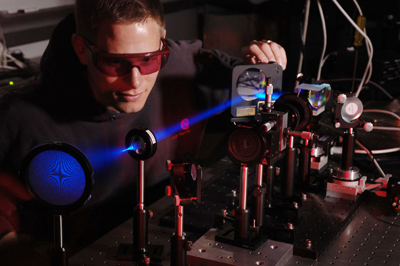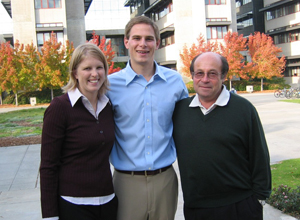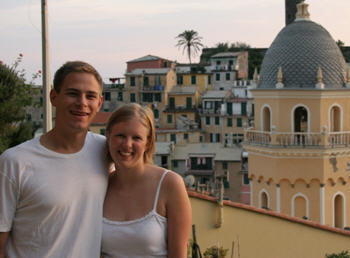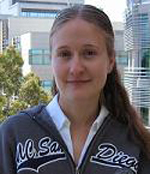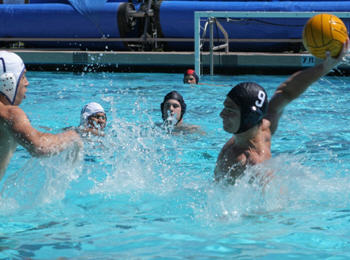Photonics Researcher at UC San Diego Wins Graduate Student Leadership Award
San Diego, CA, November 14, 2005 -- A photonics researcher, Calit2 undergraduate scholar advisor and high-school mentor was singled out by the Jacobs School of Engineering for his leadership skills and research acumen last week. Electrical and Computer Engineering Ph.D. candidate Robert Saperstein received the R.B. Woolley Graduate Fellowship in Engineering Award for the 2005-'06 academic year.
|
The $5000 fellowship is given annually to a continuing graduate student who has a record of notable academic achievements and demonstrates leadership in graduate research and Jacobs School activities. The university named the leadership award to honor retired venture capitalist Buzz Woolley's contributions to UCSD's graduate fellowship program.
"In my life, giving and being involved in the community has aided in a lot of ways, so we were happy to help out with these fellowships," says Buzz Woolley, who attended the Nov. 7 ceremony with his wife, UCSD general counsel Ann Parode. "All we request is that -- when you students get into a job -- that you do something to help out. Math and science education is so weak in this country, and the people in this room have the capability to ease that problem."
|
The selection committee for the award included Woolley, Jacobs School associate deans Jeanne Ferrante and Charles Tu, and deputy director for external relations Joe Bear.
Electrical engineering students have now won the Woolley Fellowship two years in a row. Previous winner Adam Conway and this year's recipient share something else in common: both are competitive swimmers. Rob Saperstein is a two-time NCAA Water Polo Academic All-American.
He grew up near Palo Alto, CA, the son of two scientists. Saperstein completed his undergraduate degree in electrical engineering at Princeton University in 2001, and chose UCSD for its research reputation. "I really got interested in optics as a junior at Princeton," says Saperstein, who is now married to wife Julia. "Since then I have focused on photonics, and UCSD is a world-class institution in this arena."
|
Saperstein is part of ECE Professor Shaya Fainman's Ultrafast and Nanoscale Optics Group. His focus: femtosecond laser pulses for ultra-high-speed optical signal processing. In particular, he is working on a way to get around the traditional requirements for massive parallelization in systems that analyze and generate optical and microwave signals. "This downscaling of complexity is ultimately geared toward creating compact, cost-effective and highly integrated alternatives to present methodologies," says Fainman. "Robbie also pioneered a technique for pulse shaping and processing using longitudinal spectral decomposition, enabling an increase of a few orders of magnitude in the values of time-bandwidth products as compared to existing techniques."
At the ceremony, ECE chair Paul Yu singled out Saperstein for advising and mentoring younger grad students, undergraduates, middle and high school students. The graduate student developed a nine-month research project for an undergraduate to investigate how to get around wavelength-dependent changes in light polarization as a beam reflects off of a short length of modified optical fiber-known as a fiber Bragg grating-used in optical telecommunications.
|
Saperstein successfully sought funding from the National Science Foundation (NSF) and the California Institute for Telecommunications and Information Technology (Calit2). "I designed a work plan for an undergrad to spend the winter quarter learning and understanding the problem and the spring quarter designing the experimental approach," he recalls. "NSF's Research Experience for Undergraduates program funded those months, then Calit2 provided one of its Summer Undergraduate Scholarships to give the student, Crescentia Miscisin, ten weeks over the summer to carry out the experimental work." Miscisin recently represented Calit2 at a meeting of senior UC officials where she briefed them on her photonics research project.
Saperstein is also an advisor to the UCSD Preuss School's Botball robotics club. He helps students in grades 7 through 10 build autonomous robots using Lego motors, sensors and processors. They compete locally and regionally in organized Botball competitions. "I have especially enjoyed working with everyone at the Preuss School," says Saperstein. "The students come from families where neither parent has gone to college, so the mentoring and guidance can really demonstrate the potential of and motivate these students to go on to college -- and hopefully to UCSD."
The fifth-year graduate student has also individually mentored Jose Lira, 16, since the Preuss School student was an 8th grader. They meet once a week and interact often by email, and Saperstein has watched Jose grow in the process. "Today Jose is in 11th grade, and I look forward to helping him with his college applications," says Saperstein proudly. "He has gone from being ineligible for sports because of academics, to having a 3.0 average, getting excited about science fair, and being a star on the Preuss lacrosse team."
|
Saperstein admits to having undergone an evolution in his leadership skills since arriving at UCSD, as he gradually took on greater responsibilities in the lab, in his own research, even on the department's softball team. "Grad school has been more broadly demanding than undergrad," he says, half-jokingly pointing to a drawing of Sisyphus rolling his boulder up a hill. "You have to develop survival skills such as time prioritization for personal and project management, and learning how to interact with others through collaboration, instruction and communication. Those are the basics of leadership."
Looking to the future, Saperstein says he wants to explore NSF's new Research Experiences for Teachers program, which could fund K-12 and community college teachers coming to UCSD and hopefully bring technologies from the Jacobs School back to their classrooms and clubs. He also has to finish his dissertation on "information processing with longitudinal spectral decomposition," which he hopes to finish within 18 months.
Media Contacts
Media Contact: Doug Ramsey, (858) 822-5825, dramsey@ucsd.edu

